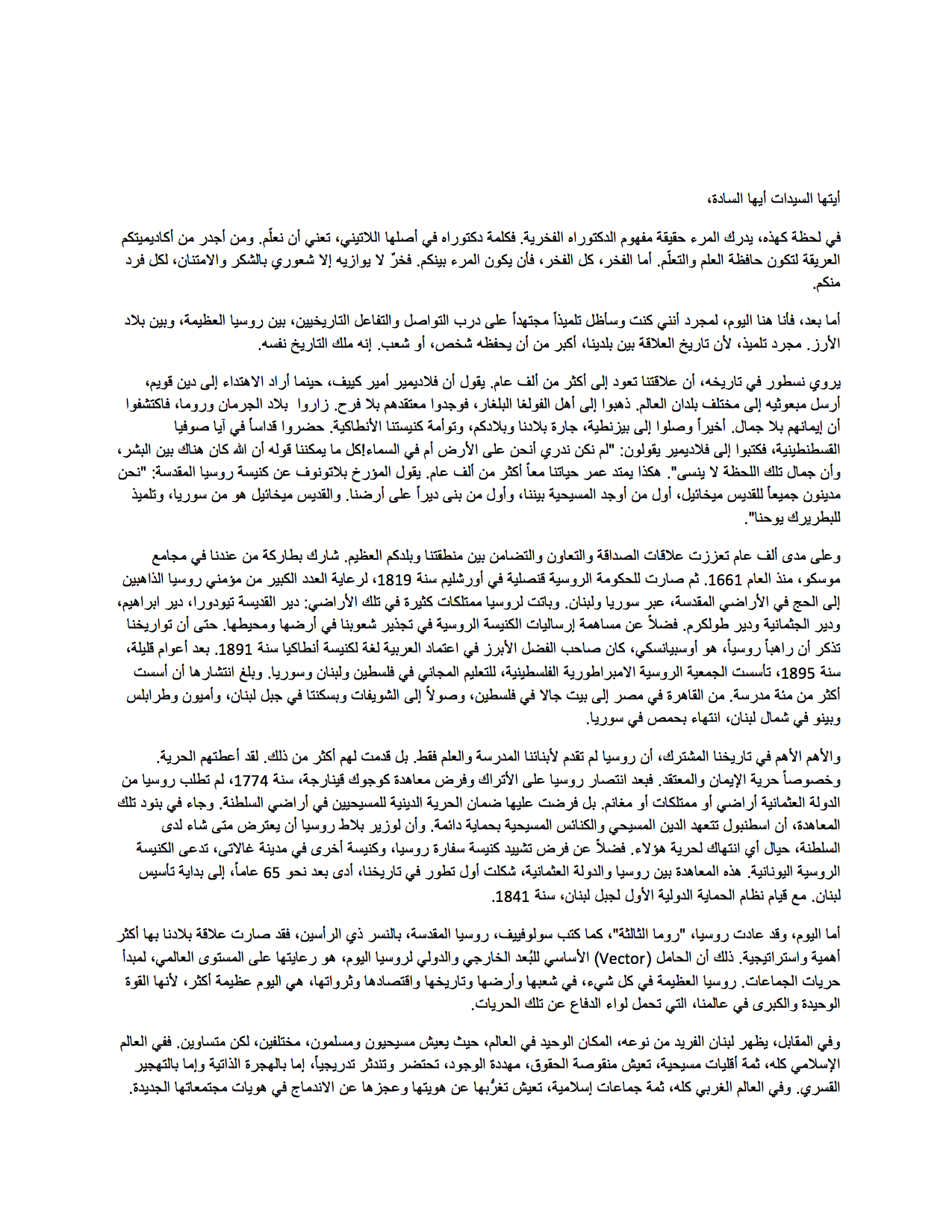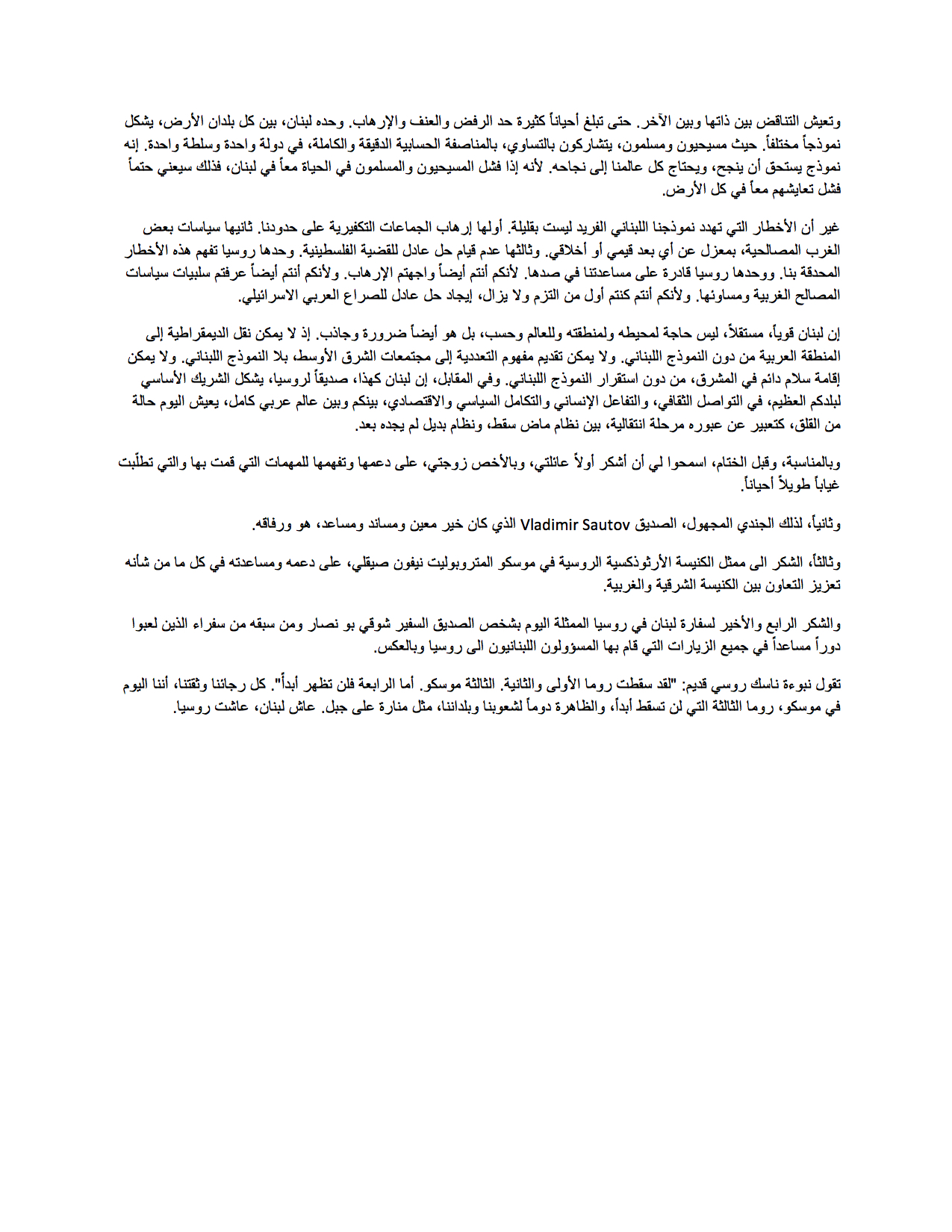How the Middle East could go the way of the Balkans
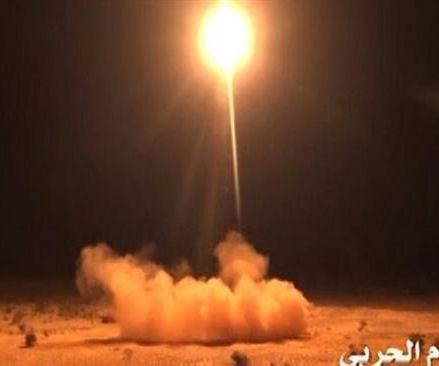 The current status of the Middle East is similar to that of the Balkans in the years before the World War I. Are we going to witness a Balkanization of the region — geopolitical fragmentation caused by other countries’ foreign policies? And what are the chances of an Iranian-Arab war or a Shiite-Sunni conflict that could lead to the redrawing of the Middle East map?
The current status of the Middle East is similar to that of the Balkans in the years before the World War I. Are we going to witness a Balkanization of the region — geopolitical fragmentation caused by other countries’ foreign policies? And what are the chances of an Iranian-Arab war or a Shiite-Sunni conflict that could lead to the redrawing of the Middle East map?
Saudi Crown Prince Mohammed bin Salman said a ballistic missile fired at Riyadh this month from Houthi militia-held territory in Yemen was supplied by Iran, and described it as “direct military aggression” and an “act of war.” The accusation was repeated by the Lebanese Prime Minister Saad Hariri in his resignation statement: “Iran controls the region and the decision-making in both Syria and Iraq. I want to tell Iran and its followers that it will lose in its interventions in the internal affairs of Arab countries.” He specifically blamed Iran for interference in the affairs of Lebanon.
Saudi rhetoric aimed at Iran has escalated in the past few weeks, and Foreign Minister Adel Al-Jubeir accused Tehran of being behind all evil acts in the region. “The Iranian terror continues to terrorize the innocent, kill children and violate international law, and every day it is clear that the Houthi militias are a terrorist tool to destroy Yemen,” he said. “The Kingdom reserves the right to respond to Iran at the right place and time.” Last week Saudi Arabia called on the UN to take measures against Iran to hold Tehran accountable for its conduct.
Events are moving fast. They could lead to a military confrontation, including the intensification of proxy wars, and a deepening of the Shiite-Sunni divide. The danger persists as long as the two superpowers, Russia and the US, stand on opposing sides of the spectrum on many regional issues, especially Iran. Recent comments from the Oval Office make it clear that the latest events have full US approval and conform with its expectations and policies.
The Iranian ballistic missile program is a key factor in Arab strategies and alliances. Many countries in the Middle East started heading east and west to purchase air defense missiles, such as the Russian S-300 and S-400 and the American Patriot and THAAD systems. Arab countries also started to think of producing their own military equipment by having offset projects with weapons manufacturers in China, Russia, Ukraine, South Africa, France, the UK, Germany, Brazil and the former Yugoslavia.
Saudi Arabia is also concerned about the influence of Iran in Lebanon through its proxy, Hezbollah, even more so since Riyadh believes Hezbollah operatives fired the most recent missile launched at the Kingdom from Yemen. “The Lebanese must all know these risks and work to fix matters before they reach the point of no return,” said the Saudi Minister for Arab Gulf Affairs Thamer Al-Sabhan.
Russia is keeping a close eye on the growing threat of military action against Iran — not a direct conflict, which is unlikely, but an extension of existing proxy wars.
Maria Dubovikova
This war of words may lead to a military clash in the Gulf or in Lebanon, further escalation in Yemen, Iraq and Syria, where Iran has a strong presence, and further proxy wars, unless the Americans take direct action against Iranian troops in Syria and Iraq. And that would lead to a dramatic escalation of tensions between regional and international powers already competing for influence in the Middle East.
Iran is a direct threat to the stability of the region, and US President Donald Trump has listed it as a major global threat. Tehran’s growing influence in Iraq, Syria, Lebanon, as well its activities in support of Houthi rebels in Yemen, pose a threat to the interests of the Arab world.
Action may be taken, including the military option, against the Iranian presence in the Levant. Escalation in Lebanon, the worst-case scenario, may result in a military conflict that would explode the region and drastically affect global stability because the players involved are so numerous and the stakes so high.
Nevertheless, the concerned sides understand that direct conflict would be a zero-sum game, and has to be avoided. The way to do so is by conducting proxy wars, but the cost of such wars on global stability and human life would also, inevitably, be too high.
Russia closely follows developments in the region because it has become directly involved. For Moscow, regional processes are critical. Historically, stability in Russia depends a lot on the climate in the region, and the Middle East is again one of its national interests. It has succeeded in building normal ties with all the players in the region, even those that are rivals with one other. Having good ties with Iran and Saudi Arabia, Russia has been proposing itself as a potential mediator in the conflict between Riyadh and Tehran, although the offer has not yet been taken up. Russia is worried about the possibility of escalation of already existing proxy wars and the emergence of new ones, especially in Lebanon.
In commenting on the dispute between Iran and Saudi Arabia, Russia has used diplomatic rhetoric, calculating all the possible risks and scenarios. A war in Lebanon would mean a drastic deterioration in regional stability, especially in Syria. The region needs stability, and political and diplomatic solutions for its disputes.
Article published in Arab News: http://www.arabnews.com/node/1194021
Photo credit: Mersad
Iran in Yemen?
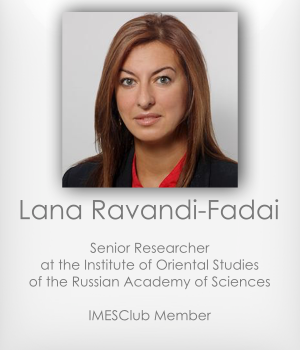 US Secretary of State John Kerry said recently Iran is “obviously” aiding the Houthi uprising in Yemen. According to Saudi Arabia’s ambassador to the United States, "Iran provides financial support for the Houthis and helps them in building weapon factories and providing them with weapons.”[1] "There are 5,000 Iranians, Hezbollah and Iraqi militia on the ground in Yemen," an unnamed diplomatic official in the Gulf is reported as saying.[2] The Editor-in-Chief of the Arab Times of Kuwait calls the Houthis Iran’s “dummy”[3] and “tools” of Iran and Hezbollah.[4] In Britain, “The Telegraph” writes of “the Iranian-backed takeover of Northern Yemen”[5]
US Secretary of State John Kerry said recently Iran is “obviously” aiding the Houthi uprising in Yemen. According to Saudi Arabia’s ambassador to the United States, "Iran provides financial support for the Houthis and helps them in building weapon factories and providing them with weapons.”[1] "There are 5,000 Iranians, Hezbollah and Iraqi militia on the ground in Yemen," an unnamed diplomatic official in the Gulf is reported as saying.[2] The Editor-in-Chief of the Arab Times of Kuwait calls the Houthis Iran’s “dummy”[3] and “tools” of Iran and Hezbollah.[4] In Britain, “The Telegraph” writes of “the Iranian-backed takeover of Northern Yemen”[5]
Sergei Serebrov, of the Moscow Institute of Oriental Studies, noted that the Telegraph’s claim would be unarguably true had it been followed by the qualification “11 centuries ago.”[6] And he is far from the only observer skeptical that Iran stands behind the Houthi eruption in Yemen. Wikileaks documents analyzed on the Al-Bab website indicate the US was not convinced by the Yemeni government’s repeated claims of Iranian involvement in a series of conflicts with the Houthis over the last decade[7] — claims made by the regime of former Yemeni president Ali Abdullah Saleh, who is now allied with the Houthis (and who in 2011 found refuge in Saudi Arabia, the country now assaulting his forces from the skies). The US Embassy in Yemen, according to a leaked 2009 memo, was more concerned with the interference of Saudi Arabia and other gulf states, which it feared might make Iranian alleged involvement a self-fulfilling prophecy:
… we can think of few ways to more effectively encourage Iranian meddling in the Houthi rebellion than to have all of Yemen's Sunni neighbors line up to finance and outfit Ali Abdullah Saleh's self-described ‘Operation Scorched Earth’ against his country's Shia minority.[8]
Now, with a fragile Iran-US détente underway and sanctions a step closer to ending, Iran would be risking much more by stepping into the Yemen imbroglio than it would have in 2009. Why unnecessarily antagonize the US and jeopardize the longed-for sanctions breakout for a prize of such questionable practical value? Or for that matter, why antagonize Saudi Arabia? While it’s a widely accepted truth that Iran will get up to any mischief it possibly can against the Saudis, Iranian President Hassan Rouhani made a point of calling for a mending of relations with the Kingdom soon after his election. The US National Intelligence’s annual security assessment in February also noted that Iran was still seeking to “deescalate tensions with Saudi Arabia.”[9]
Iranian involvement in Syria and Lebanon is already a serious drain on the limited resources of an economy shackled by sanctions. From the Iranian security perspective, those countries are strategically crucial, a buffer between itself and Israel. Not only is Yemen not a buffer against a perceived threat, but its devastating poverty makes it an expensive proposition. A Houthi government under Iranian auspices would require massive financial support. What would be the motive? To reestablish the Persian Empire, the rationale repeatedly put forth the Saleh administration for alleged Iranian meddling in Yemen, according to Wikileaks? Rhetoric aside, behind the scenes the Americans were not convinced.
The smart play for Iran at this critical juncture is not to rock the boat unnecessarily, which corresponds to its official line: a denial that it provides military support to the Houthis coupled with vociferous condemnations of the bombing campaign and calls for all the warring parties to come to the negotiating table.
Whatever external factors are exacerbating the conflict in Yemen, the main spark is internal, and as related to the country’s economic problems as it is to the much-trumpeted Shia-Sunni conflict. Yemen is one of the poorest Arab countries, with 50% of the population below the poverty level, despite potentially lucrative fishing and some oil. The recent Saudi withholding of funds from a promised bailout package and the sabotage of oil pipelines and electricity infrastructure in the Mareb Province of Yemen have only compounded economic woes. When President Abd Rabbuh Mansur Hadi’s government abolished energy subsidies last summer, causing a spike in the price of gasoline, the result was protests in the streets with the army called in to put them down. Social unrest is common, and the populace has arms and knows how to use them – some say guns far outnumber people in Yemen. Even in peaceful times, Sana’a has the feel of a Wild West town: men strolling the streets or sitting in cafes with their “ali” (AK-47) and pickups zooming by with mounted chain machine guns.
Yet Sana’a was taken by the Houthis without much of a fight. That and their dramatic advance to Aden owes much to a formidable domestic ally, former Yemeni president Saleh, ousted in Yemen’s “Arab Spring” but still commanding a great deal of loyalty in the government and military. He is a wily political survivor who has switched sides more than once in the past, this time making an advantageous alliance with his former foes. It was Saleh’s regime killed Al-Houthi, founder of the movement.
Trade and economic ties between Iran and Yemen were weak under former president Saleh; and under President Hadi they had been all but shut down. But with Hadi fleeing to Aden and the Houthis essentially taking control of the government in February, preliminary agreements were signed between Yemen and Iran on reconstructing the port of Al Hudaydah on the Red Sea and establishing regular direct Iran-Yemen passenger flights. And no wonder, with all other outside funding cut off or on hold. Apparently, the prospect of this deal too much for the Saudis and their allies. Accusations followed immediately that the flights were for military supplies from Iran, and soon after that, the bombs began coming down.
The Zaydiyyah Shia branch in Yemen, to whom the Houthis belong, differs in many ways from the Ja’fari Islam of Iran, and is similar in many ways to Sunni Islam. The two Shia schools do, however, share the concept of the Imamate, as distinct from the Sunni; and ideological resonance seems to have been increasing in recent decades. The Zaydi imamate ruled from 897 to 1962, its territory expanding and contracting, but the heartland always remaining in the mountainous northwest of Yemen, where the Houthis are now based. Like the Zaydis, Ja’faris and all Shia sects, the Houthis come into being as a force of opposition to the powers that be, in the 1990s. The founder of the Houthi movement, also known as “Ansar Allah,” was Said Hossein Al-Houthi, a Yemeni parliamentarian of aristocratic heritage and a religious education from Sa’ada, that same mountainous Zaydi heartland in the north of Yemen, bordering on Saudi Arabia. His family enjoys great respect among the tribes there, and in Yemen, tribal alliances are everything. Al-Houthi came into conflict with former president Saleh in the early 2000s. In addition to defending the interests and culture of the Zaydi minority against what he saw as an encroaching Salafi presence backed by Saleh, Al-Houthi decried Yemen’s alliance with and reliance on the US and Saudi Arabia. After increasingly tense clashes with the government, he was killed in 2004. His brothers, primarily Abdul Malik, now lead the movement, which has also made battling corruption a centerpiece of its rhetoric. Despite the Houthis’ “Death to America” chants and placards, some Yemenis’ believe that the Americans may not have been opposed, at least early on, to the Houthis’ growing power as a counterbalance to the greater evil of Al-Qaeda and other extremist Sunni groups in Yemen. Just to further muddy the waters….
[1] http://news.yahoo.com/far-does-irans-backing-yemen-rebels-220527393.html;_ylt=AwrBT8A11CdV0vIArn1XNyoA;_ylu=X3oDMTEzOGJjZG5lBGNvbG8DYmYxBHBvcwMxBHZ0aWQDVklQNjE5XzEEc2VjA3Nj
[2] http://news.yahoo.com/far-does-irans-backing-yemen-rebels-220527393.html;_ylt=AwrBT8A11CdV0vIArn1XNyoA;_ylu=X3oDMTEzOGJjZG5lBGNvbG8DYmYxBHBvcwMxBHZ0aWQDVklQNjE5XzEEc2VjA3Nj
[3]http://www.arabtimesonline.com/NewsDetails/tabid/96/smid/414/ArticleID/212500/reftab/96/t/Rouhani-just-chill/Default.aspx
[4]http://www.arabtimesonline.com/NewsDetails/tabid/96/smid/414/ArticleID/212668/reftab/96/Default.aspx
[5] http://www.telegraph.co.uk/news/worldnews/middleeast/yemen/11487796/Yemen-is-a-battlefield-for-Saudi-Arabia-and-Iran.html
[6] http://echo.msk.ru/programs/sorokina/1521146-echo/
[7] http://www.al-bab.com/blog/2015/april/yemen-us-houthis.htm#sthash.uo83wn9T.u7sQ9zTs.dpbs
[8] ibid.
[9] http://www.newsweek.com/iran-and-hezbollah-omitted-us-terror-threat-list-amid-nuclear-talks-314073
4 March, 2015: His excellency Doctor Amal Hikmat Abou Zeid delivered a speech in Moscow
On the 4 March, 2015 in the «Ritz Carlton» Hotel a solemn ceremony of awarding an honorary doctorate (honoris causa) of the Institute of Oriental Studies with handling of the diploma and the mantle to the prominent Lebanese figure – Mr. Amal Hikmat Abou Zeid took place.
The ceremony was attended by notorious political figures, scientists, representatives of the diplomatic corps of the foreign countries and also by Mitropolit Niphon Saikali (Russia), Representative of the Patriarch of Antioch in Moscow.
The congratulatory addresses were delivered by Vitaly Naumkin (Director of the Institute of Oriental Studies, corresponding member of RAS), Shawki Bou Nassar (Lebanese Ambassador in Moscow), Vladimir Sautov (Vice president of JSC "SPC Irkut", orientalist, Ph.D., Alexander Panov (Deputy director of the Department of the Middle East and North Africa, the Russian Foreign Ministry), Alexey Sarabiev (Head of Research and Publications of the Institute of the Oriental Studies, Ph.D.).
In his acceptance speech, Mr. Amal Hikmat Abou Zeid thanked the audience and the Institute of Oriental Studies of the Russian Academy of Sciences in the person of its Director Vitaly Naumkin for the honour to become its honoris causa.
LBC Group TV release on the event:
Article covering the event on Tayyar.org:
Article covering the event on Lebanese-Forces.com :
بالصور: أكاديمية العلوم الروسية تكرمّ أمل أبو زيد
Article covering the event on Elnashra.com :
أكاديمية العلوم الروسية تكرم أبو زيد
Article covering the event on almarkazia.com :
الاكاديمية الروسية كرمت ابو زيد ومنحته الدكتوراه وتقديراً لنجاحه في تطوير العلاقات بين البلديــــن
Article covering the event on alkalinaonline.com :
بالصور - أكاديمية العلوم الروسية تكرمّ أبو زيد
The speech of his excellency Doctor Amal Hikmat Abou Zeid in English:
Ladies and Gentlemen,
In such a moment, we realize the true concept of the “honorary doctorate”. The Latin roots of word PhD mean that we master knowledge, and who would be more worthy than your prestigious academy to be the great guardian of science and learning. And all the pride isn’t but being among you. Such Pride isn’t equaled unless by my feeling of gratitude and thanks.
Having said so, I’m here today, simply because I was and will remain a diligent assiduous student, walking on the path of historical communication and interaction, between the Great Russia and the country of Cedars. I say a simple student, because the relationship history of our two countries is so great that not only one person or people can preserve it. It belongs to History itself.
Nestorius tells in his history, that our relationship dates back to more than a thousand years. He says that Prince Vladimir of Kiev, and upon wanting to be guided to the upright religion, sent his envoys to various countries of the World. They went to the Volga Bulgarian people, where they found their faith, but without joy. They visited the countries of the Germanic and Rome, where they discovered their faith was deprived of beauty. Finally, they reached Byzantine, a neighbor of both your and our countries, and the twin of our Antiochian Church. They attended mass at “Hagia Sophia of Constantinople Church”, and wrote to Vladimir, telling him: “We did not know whether we were on Earth or in Heaven! All we can say that God was there among humans and that moment is unforgettable.” This is how our life age extends back to more than one thousand years. Historian Platonov says about Russia Holy Church: “We owe it all to St. Mikhail, he was the first who established Christianity among us, and the first to build a monastery on our land. And St. Mikhail comes from Syria, and was the pupil of Patriarch John.”
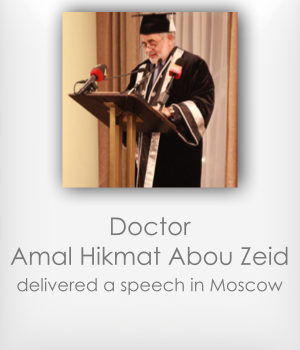
Over thousand years, friendship, cooperation and solidarity ties went growing and consolidated between our region and your great country. Patriarchs, coming from our countries, participated in the synagogues of Moscow, since 1661. Afterwards The Russian Government had a Consulate in Jerusalem, in 1819, aiming to surround with care the largest number possible among the Russian faithful people, who were going to pilgrimage in the holy land, through Syria and Lebanon. Hence, Russia became the owner of many properties in those territories: the Monastery of St. Theodora, the Monastery of Abraham (Ibrahim), as well as the Monastery of Tulkarem. Additionally, the Russian Church missionaries contributed in rooting our people in our home and surroundings. Our histories even remember that thanks to a Russian monk, Ospjanski, who due to his merit, the Arabic was adopted as the language of the Church of Antioch in 1891. Few years later, in 1895, the Russian Imperial Palestinian Association was established for providing free education, in Palestine, Lebanon and Syria. Its spreading went on increasing till having founded more than hundred schools. From Cairo in Egypt to Beit-Jala in Palestine, reaching Shoueifat and Baskinta in Mount Lebanon, Amyoun , Tripoli and Bayno in northern Lebanon, and ending in Homs, Syria.
What is even more important than our common history is the fact that Russia did not only provide our children with school and education, but it gave them even more than this: It gave them freedom, especially the freedom of faith and belief. After Russia’s victory over the Ottomans and the imposition of Kucuk Qanarjh Treaty, 1774, Russia did not ask the Ottoman State for any properties or lands. But it imposed and obliged it to guarantee the religious freedom of the Christians living in the Sultanate territories. According to the terms of that treaty, Istanbul was committed to provide Christian religion, and churches with permanent protection. The Minister of the Russian Court was empowered to object, whenever he wanted to, before the Sultanate, about any violation of the freedom of the latter, additionally to having imposed the construction of the Church of the Embassy of Russia, and other church in the city of Galati, called the Russian Greek Church. This treaty between Russia and the Ottoman Empire formed the first evolution in our history, resulting some 65 years later and leading to the beginning of the establishment of the State of Lebanon, with the first international protection regime of Mount Lebanon, in 1841.
Today, Russia, the “Third Rome” is back as Soloviev wrote, the Holy Russia, with the two-headed Eagle. And thus its relationship with our country has become more important and strategic, because, the basic holder of the Russian external and international dimension nowadays is nurtured on the global level, by the principle of freedom to groups and communities. Russia the Great in its people, land, history, economy and wealth, is even greater today, because it is the only superpower in the World, carrying the banner of defending those freedoms.
In contrast, the unique Lebanon shows to be the only place in the world, where Christians and Muslims live equally together despite all their ethnic differences. In the entire Islamic world, there are some Christian minorities living, while bowing under the yoke of their incomplete rights, threatened with their presence and existence, dying and gradually disappearing, either through self-immigration or forced displacement. In the entire Western world, there are Muslims living in a complete inner struggle on keeping their identity and integrating in their new societies. They even live the contradiction between themselves and the other ones, until often reaching rejection, violence and terrorism. Only Lebanon, among all the countries of the earth, is a different model. It is the place where Christians and Muslims, share equally their duties and obligations, with accurate and complete calculations, in one state and under the same one authority and power. It is a model that deserves to succeed, and the whole world needs its success, because if Christians and Muslims fail to live together in Lebanon, it will inevitably mean the failure of coexistence together on earth.
However, the threats to our unique Lebanese model are more than a few. The first one refers to the terrorism expiatory groups on our borders. The Second one refers to some policies of the West that care for their interest only, regardless of any values or moral dimension. The third one refers to the failure to establish a just solution to the Palestinian Cause. Russia, alone, understands these imminent threats against us. Only Russia can and is able to help us, through its resistance or Veto, because you also encountered terrorism, you knew as well the negative impacts of Western interests and disadvantages. You were and still are the first to commit, to find a just solution to the Arab-Israeli conflict.
A sovereign, strong and independent Lebanon is not only a need for his surroundings, region and to the world, but it is also a necessity and element of attraction. Democracy cannot be transferred to the Arabic region without the Lebanese model. There can be no concept of pluralism to the Middle Eastern societies, without the Lebanese model. No lasting peace can be established in the Orient, without the stability of the Lebanese model. In exchange, Such Lebanon, being a friend of Russia, is the main partner of your great country, in cultural communication, human interaction, political and economic integration, between you and the entire Arab world. This world who is living today a state of anxiety, as an expression of undergoing some transition era, between a fallen past regime, and an alternative but not yet found one.
On this occasion, and before closing, let me first thank my family, especially my wife, for her support and understanding of the tasks that I accomplished and which sometimes required from me a long absence.
Second, let me also thank the Unknown Soldier, my friend Vladimir Sautov and his friends who believed and supported me in my endeavor.
Third, I address my thanks to the representative of the Antiochian Orthodox Church in Moscow Metropolitan Nifon Seikaly, for his support and help in all that would strengthen cooperation between the Eastern and Western Church.
The fourth thanks and last one is attributed to the Embassy of Lebanon in Russia, today represented by Ambassador Shawki Bou Nassar and his predecessors who played a helpful role in all visits of the Lebanese officials to Russia and vice versa.
The Prophecy of an old Russian hermit says: “Rome I and II have fallen. The third one is Moscow, and the fourth will never show”. Our hope and trust, as we are today in Moscow, that “The Third Rome” will never fall, and shall remain for our people and our countries a beacon on top of the hill. Long live Lebanon, Long live Russia.
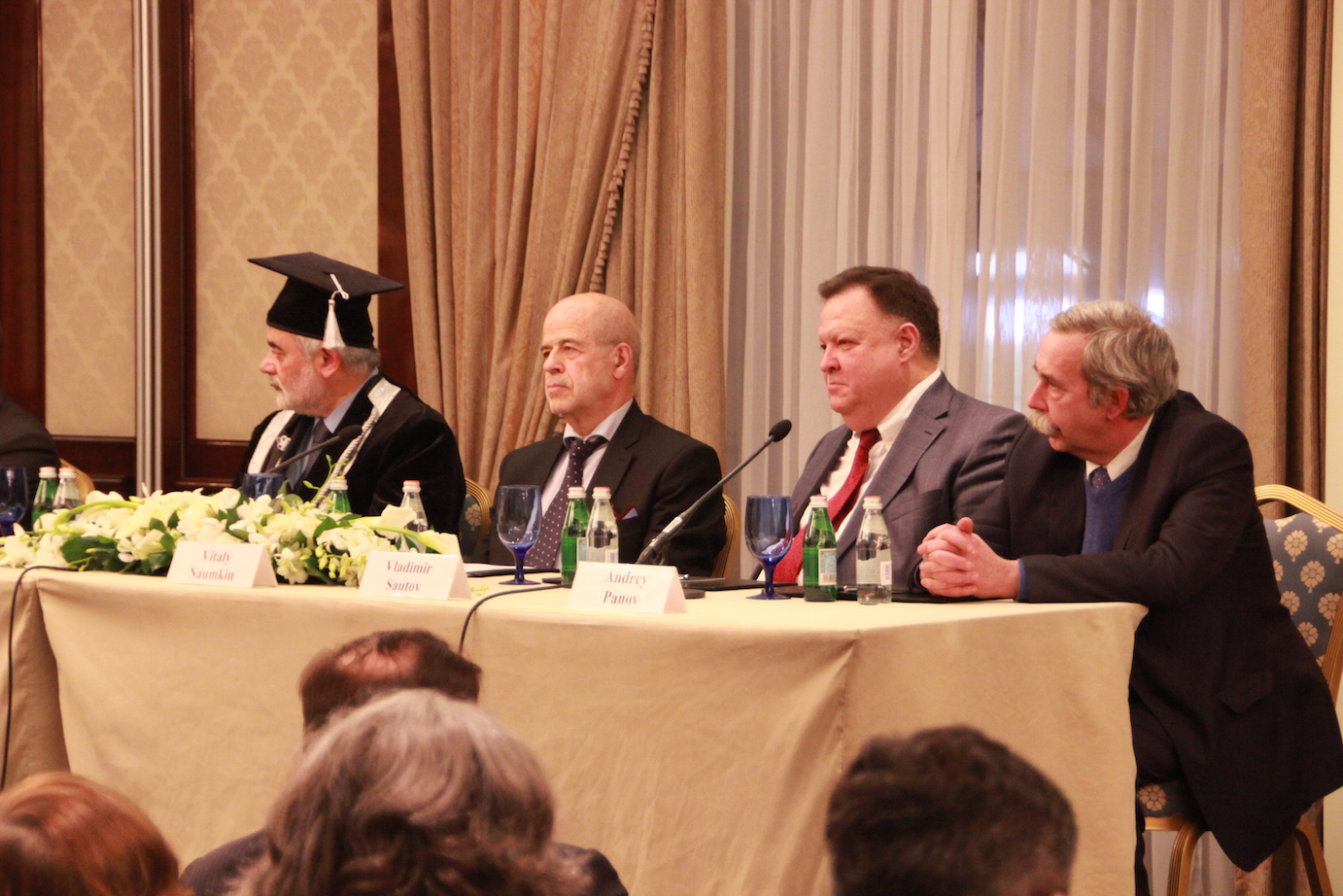
_____________________________________________________________
The text of the speech in Arabic:
(Recommendation: open the previews in another window of your browser for a full size view)
